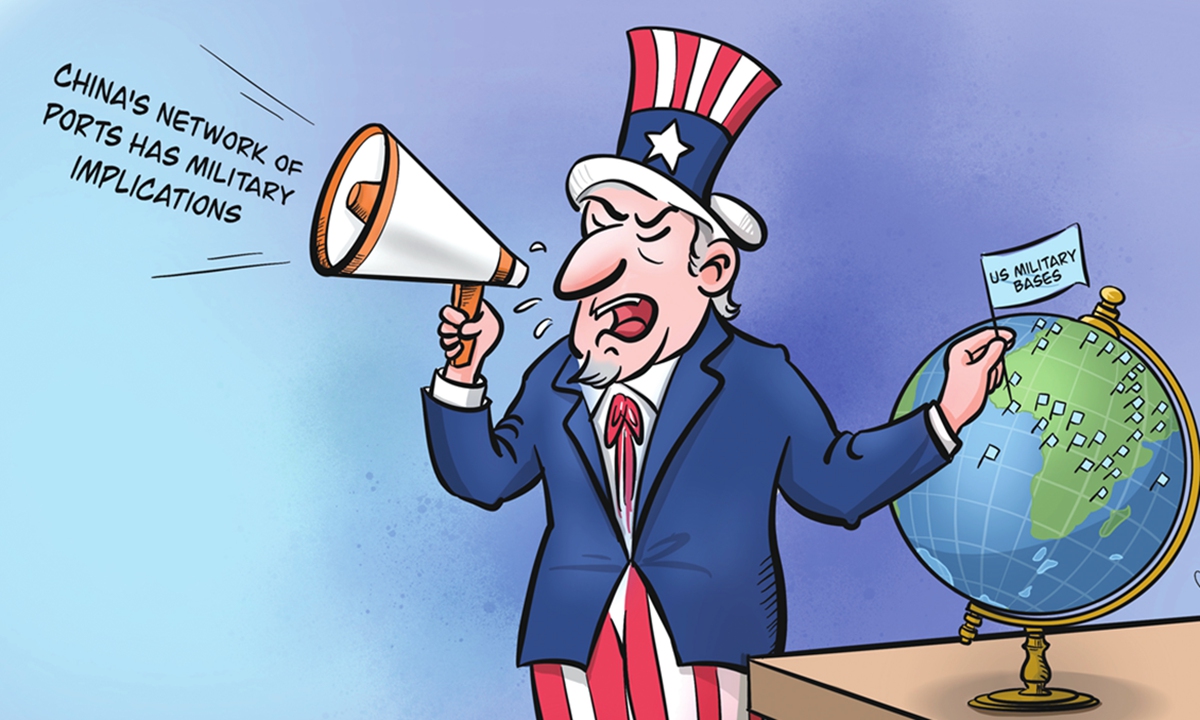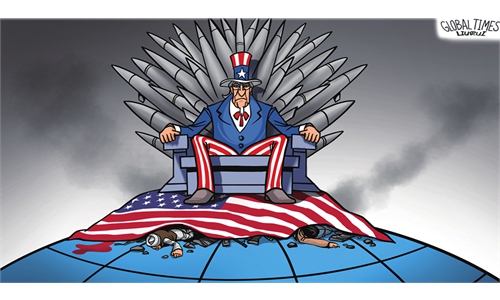Why not ask military implications of US bases worldwide before targeting China’s ports?

Illustration: Liu Xidan/GT
Rarely does a day go by in which American news consumers are not being told that China is a danger to the US and nations across the globe. The Washington Post offered a recent example. Under the headline "China has acquired a global network of strategically vital ports," the story states that in the first decade of the China-proposed Belt and Road Initiative (BRI), "China has already secured a significant stake in a network of global ports that are central to world trade and freedom of navigation. Although the stated goal of the investments was commercial, the US and its allies have grown increasingly concerned about the potential military implications."Before we delve into certain language in the Washington Post report, it is important to acknowledge the potential perception of the robust US military presence worldwide, especially in light of Washington's concerns about China's global trade ambitions. According to one estimate, in 2021, the US operated roughly 750 military bases in 80 countries and regions. That same estimate suggested East Asia was littered with such facilities, with as many as 120 in Japan and another 73 nearby in South Korea. Can anyone look at that data and not ask about the potential military implications? In the US, few will wonder about such implications because American citizens remain convinced that their men and women in uniform are securing peace. Let's set these claims of America's ambitions aside and return to the aforementioned newspaper report.
We will see where worries about China insert themselves into news reporting.
We begin with these words: "global ports that are central to world trade and freedom of navigation." Even the most vocal critics of the BRI acknowledge that the initiative is designed to make global trade easier and more interconnected. With that in mind, it does make sense for China to improve or create infrastructure at various ports where goods and services related to BRI efforts will pass. It goes without saying that neither you nor I would seek to build a house without first ensuring that its foundation is strong and able to withstand the structure.
Chinese President Xi Jinping told an international audience in 2017 that the Silk Road component of the BRI was rich in historical importance: "Spanning thousands of miles and years, the ancient silk routes embody the spirit of peace and cooperation, openness and inclusiveness, mutual learning and mutual benefit. The Silk Road spirit has become a great heritage of human civilization." Donald Trump was the US president at the time. What was his response to the BRI? A corrosive and risky form of nationalism wrapped in fear and dubbed "America First." Note that President Xi was talking about opening doors and embracing history while president Trump was slamming doors and offering ill-informed rhetoric about China.
President Xi wanted to build on a firm foundation, but Trump wanted to undermine the foundation. Wouldn't you agree that undermining the foundation would be a threat to the global order?
As we return to the Washington Post story, we further understand how unnecessary suggestions about a dangerous China infect storytelling. Take a look at this phrase: "the US and its allies have grown increasingly concerned about the potential military implications." The key word here is "potential." Potential means something might happen. Then again, it might not. Potential is a loaded term that allows for enough wiggle room so that if some event does not actually occur, the people (or governments) that stoked any anxiety can walk away and absolve themselves of any blame.
By now, you are well aware of how short-sighted nationalism and irrational fears about China have led to multiple flawed pieces of US federal legislation. The United States Innovation and Competition Act, passed in 2021, is a notable example.
The bloated $250 billion bill was supposed to counter any aggressive attempts China would make in the coming years to lessen America's leading role in upholding the global order created by the West. Critics were out there, but they could not drown out the nonstop rhetoric from one politician after another who insisted that the act was right and it was being debated at the right time.
Do you think such scrutiny took place? Of course not, partly because elected politicians are not interested in seeking such answers; rather, they want to waltz into meetings with their constituents and boast that they did their part to protect America from the evil monster residing in Beijing.
Americans should receive reasoned analysis about China, which would allow for them to gain a more complete understanding of the country's vision for the 21st century. Instead, fear is replaced by analysis, and therefore hostile perceptions remain in place. And we know which industries benefit from that.
The author is an associate professor at the Department of Communication and Organizational Leadership at Robert Morris University. opinion@globaltimes.com.cn

